RT37 CPCS Blue Card Renewal Mock Test with 122 Questions and Answers / A37 Trencher
£15.00 Original price was: £15.00.£9.95Current price is: £9.95.
Practice for your RT37 CPCS blue card renewal test with practice multiple choice questions – Just like the real NOCN/CPCS test!
- Questions & Answers: based on the latest RT 37 Trencher – CPCS Renewal Test Revision FACTSHEET
- Categories: A 37 – Trencher
- Number of Multiple-choice Questions: 122
- Format: PDF
- Delivery time: Instant download after checkout
- Refunds: No refunds once downloaded, unless you ordered duplicates by mistake.
If there are any issues with your download, please email CardRenewalTest@gmail.com and we’ll send it ASAP
Ace Your CPCS Blue Card Renewal with RT37 Trencher Mock Practice Test
Are you a dedicated trencher operator looking to extend your CPCS blue card for another five years? Perhaps you’ve already attempted the renewal test and found it more challenging than expected. Fret not! We have just the solution you need to ensure your success. Introducing our “RT37 Trencher CPCS Blue Card Renewal Mock Practice Test” – your key to mastering the renewal exam and securing your blue card extension.
Why Do You Need These Mock Questions?
Renewing your CPCS blue card is a critical step for any trencher operator. It not only proves your competence but also opens up opportunities for better employment. However, the renewal test can be daunting, especially if you’ve been out of practice. Here’s why you need our mock questions:
1. Practice Makes Perfect: Just like trencher operations, practice is essential for success. Our mock test is designed to replicate the real CPCS blue card renewal exam, allowing you to become familiar with the format and types of questions you’ll encounter.
2. Test Your Knowledge: The renewal exam covers various aspects of trencher operation, safety, and regulations. Our mock questions cover all the important topics, ensuring that you’re well-prepared for anything that comes your way.
3. Realistic Experience: With our mock test, you’ll experience the time constraints and pressure of a real exam. This simulation will help reduce anxiety and improve your test-taking skills.
What Will You Learn?
Our RT37 Trencher CPCS Blue Card Renewal Mock Practice Test is not just a set of questions and answers; it’s a comprehensive learning tool. You’ll learn:
1. Trencher Operation Essentials: Gain a deep understanding of trencher machinery, components, maintenance, and safe operation.
2. Safety First: Familiarize yourself with safety precautions and measures to minimize risks while operating a trencher.
3. Regulations and Best Practices: Learn about industry regulations and best practices to ensure you’re always in compliance.
4. Real-Life Scenarios: Our questions are based on the latest NOCN CPCS RT37 Trencher factsheet, providing you with real-world scenarios to enhance your problem-solving skills.
How to Pass the CPCS Blue Card Renewal Test:
- Study: Use our mock test as a study guide. Review the questions and answers, and understand the reasoning behind each answer.
- Practice: Take the mock test multiple times to improve your speed and accuracy. Use it as a diagnostic tool to identify areas where you need more work.
- Stay Updated: The construction industry is always evolving. Ensure you’re up-to-date with the latest industry standards and regulations.
- Stay Safe: Safety is paramount in trencher operations. Make sure you understand and follow all safety guidelines and best practices.
- Confidence is Key: Believe in yourself and your abilities. The more confident you are, the better you’ll perform in the renewal test.
In Conclusion
Our RT37 Trencher CPCS Blue Card Renewal Mock Practice Test is your ticket to a successful renewal. Don’t let the fear of the exam hold you back from extending your blue card. With thorough preparation, practice, and confidence, you’ll not only pass the test but also become an even more competent trencher operator.
So, are you ready to secure your blue card extension? Get started with our mock test and renew your CPCS blue card with confidence.
Related Keywords: CPCS card expired, CPCS renewal test questions, CPCS competent operator renewal, CPCS renewal mock test, CPCS blue card renewal, renew CPCS card, book CPCS renewal test, CITB card renewal, CPCS blue card renewal mock test, NOCN renewal test, CPCS ticket renewal, CPCS renewal touch screen test, CPCS card extension.
These points from the RT37 Trencher Factsheet cover essential safety and operational considerations when using trenchers.
Preparation for Work (Preparation):
- Trenchers are specialized machines designed for forming cuts or trenches below the surface using cutting wheels or chains.
- Regular checks and adjustments are essential, following the manufacturer’s manual guidelines.
- Immediate reporting of defects is crucial to prevent potential issues.
- Neglecting pre-use checks can lead to safety incidents, including component failures.
- Proper guarding of rotating trencher components is necessary to minimize contact.
- Guarding can be removed for maintenance only when the engine is stopped.
- Chain tension adjustments should align with the manufacturer’s guidance.
- Correct tension prevents chain-related problems, such as running off or breaking.
- Cutting teeth wear over time and depend on the material type, impacting cutting efficiency.
- Proper teeth selection and timely replacement are essential to maintain efficiency and reduce trencher strain.
Working Safely and with Others (Working Safely):
- Operators working near the rotating cutting wheel or chain face the highest risk.
- The area around the cutting wheel or chain is particularly hazardous for others.
- When using an assistant, ensure their safe positioning away from danger areas.
- Manual clearing of spoil behind the trencher can be hazardous due to rotating parts.
- Disengage the chain or wheel drive before repositioning the trencher.
- Consider trench collapse risks, especially when standing directly behind the cutter.
- Segregate open trenches and maintain safe distances when cutting near them.
- Trenchers can overturn on steep slopes, requiring adherence to manufacturer criteria.
- Roll-over protective structures (ROPS) may minimize injuries during overturns with the use of seat belts.
- Vibration can have health effects on operators, with measures to control whole body vibration.
- Suspension seats minimize vibration, but proper adjustment is necessary.
- Excessive vibration indicates inefficient cutting, potentially due to worn teeth.
Underground Hazards:
- Check for underground services before excavation, consulting utility providers.
- Cable avoidance tools may have limitations, especially with plastic piping.
- Manual digging is recommended near known service locations.
- Confirm minimum distances or conditions with utility providers.
- A permit to work is required before new site or location excavation.
- Be alert for signs of contact with buried objects, such as increased vibration.
- Beware of the risk of a cutting chain catching an underground cable, leading to potential injuries.
Be the first to review “RT37 CPCS Blue Card Renewal Mock Test with 122 Questions and Answers / A37 Trencher” Cancel reply
Related products
CPCS Blue Card Renewal Tests
RT40 CPCS Blue Card Renewal Mock Test with 139 Questions and Answers / A40 Slinger Signaller
CPCS Blue Card Renewal Tests
RT30 CPCS Blue Card Renewal Mock Test with 113 Questions and Answers / A30 Piling Rig Tripod
CPCS Blue Card Renewal Tests
CPCS Blue Card Renewal Tests
RT09 CPCS Blue Card Renewal Mock Test with 112 Questions and Answers / A09 Forward Tipping Dumper
CPCS Blue Card Renewal Tests
RT39 CPCS Blue Card Renewal Mock Test with 140 Questions and Answers / A39 Skip Handler
CPCS Blue Card Renewal Tests
RT34 CPCS Blue Card Renewal Mock Test with 130 Questions and Answers / A34 Crawler Tractor Dozer
CPCS Blue Card Renewal Tests
RT23 CPCS Blue Card Renewal Mock Test with 125 Questions and Answers / A23 Skid Steer Loader
CPCS Blue Card Renewal Tests
RT17 CPCS Blue Card Renewal Mock Test with 144 Questions and Answers / A17 Telescopic Handler




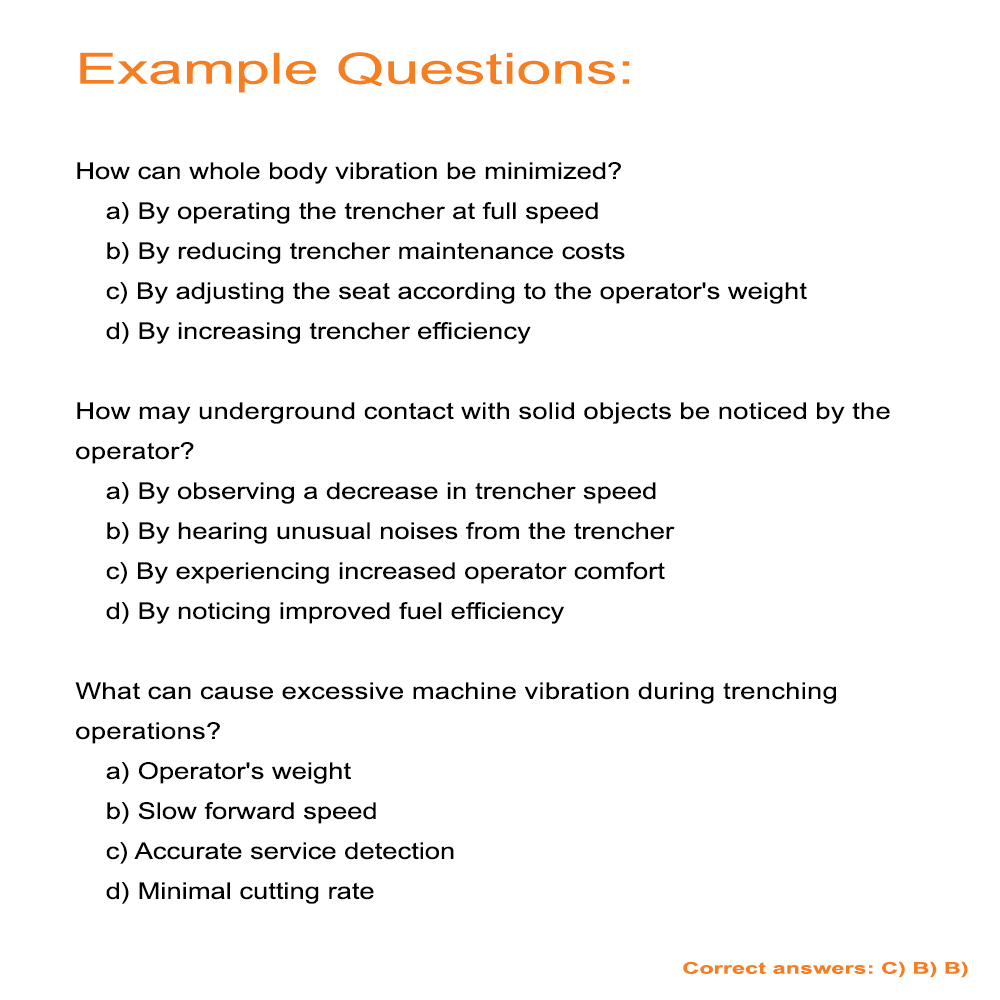
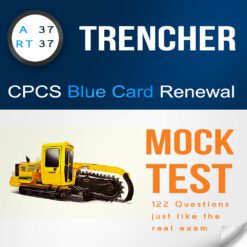

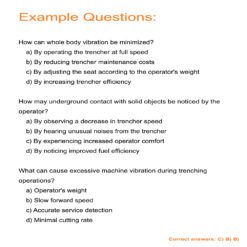

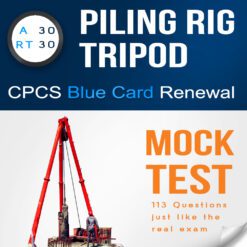
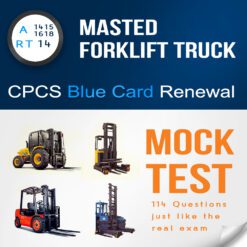


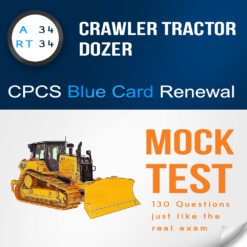
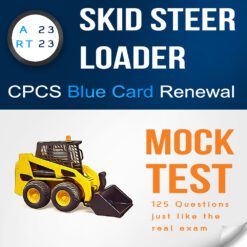
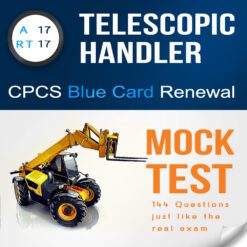
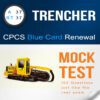
Reviews
There are no reviews yet.